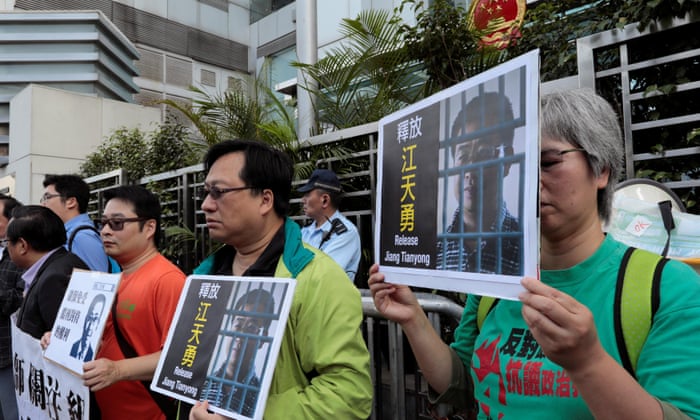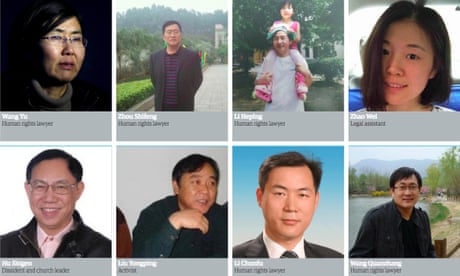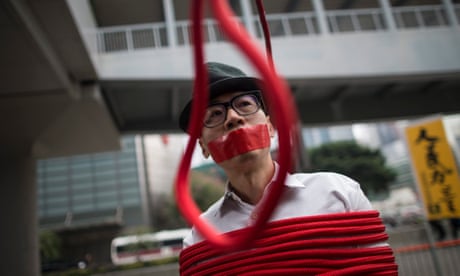By Emily Rauhala and Simon Denyer

Jiang Tianyong in 2012.
BEIJING — A Chinese court on Tuesday convicted a prominent human rights lawyer of “inciting subversion of state power,” a vague charge often used to jail critics of the Chinese Communist Party, and sentenced him to two years in prison.
Jiang Tianyong, 46, is the latest lawyer known for defending government critics to be jailed.
More than 200 have been detained over the last two years in the ongoing crackdown on criticism in China.
The court in the central Chinese city of Changsha said Jiang tried to “overthrow the socialist system” by publishing articles on the Internet, accepting interviews from overseas media, smearing the government and over-publicizing certain cases.
His defenders maintain these are all normal activities of his job as a lawyer.
The trial and sentencing are seen by human rights experts as an attack on what remains of the country’s legal activist community and on liberal politics in general, as Xi Jinping moves to bolster the Communist Party and purge its critics.
“This case has been an absolute travesty from the beginning, sustained by nothing other than pure political persecution, not facts or broken laws,” said Sophie Richardson, China director of Human Rights Watch. “By putting Jiang Tianyong behind bars, China does him, his family and itself irrevocable harm.”
“Jiang Tianyong’s trial was a total sham,” William Nee, China researcher at Amnesty International, said in a statement.
“Even with the most rudimentary examination of the facts, the case against him crumbles,” he continued.
The court in the central Chinese city of Changsha said Jiang tried to “overthrow the socialist system” by publishing articles on the Internet, accepting interviews from overseas media, smearing the government and over-publicizing certain cases.
His defenders maintain these are all normal activities of his job as a lawyer.
The trial and sentencing are seen by human rights experts as an attack on what remains of the country’s legal activist community and on liberal politics in general, as Xi Jinping moves to bolster the Communist Party and purge its critics.
“This case has been an absolute travesty from the beginning, sustained by nothing other than pure political persecution, not facts or broken laws,” said Sophie Richardson, China director of Human Rights Watch. “By putting Jiang Tianyong behind bars, China does him, his family and itself irrevocable harm.”
“Jiang Tianyong’s trial was a total sham,” William Nee, China researcher at Amnesty International, said in a statement.
“Even with the most rudimentary examination of the facts, the case against him crumbles,” he continued.
“His so-called confession and apology, extracted under duress, were nothing more than an act of political theater directed by the authorities.”
Jiang is one of more than 200 lawyers, legal assistants and activists detained in what is known as the “709 crackdown” for the day the purge started — July 9, 2015.
Some were released, but a number of leading lawyers have been charged with subversion, smeared in the party-controlled press, then subjected to what critics call political show trials, where they inevitably confess, on camera, to whatever charges they face.
In recent weeks, Chinese authorities stopped the child of another human rights lawyer who was targeted, Wang Yu, from traveling abroad to study.
Jiang is one of more than 200 lawyers, legal assistants and activists detained in what is known as the “709 crackdown” for the day the purge started — July 9, 2015.
Some were released, but a number of leading lawyers have been charged with subversion, smeared in the party-controlled press, then subjected to what critics call political show trials, where they inevitably confess, on camera, to whatever charges they face.
In recent weeks, Chinese authorities stopped the child of another human rights lawyer who was targeted, Wang Yu, from traveling abroad to study.
Wang’s lawyer, Li Yuhan, was detained in October.
Jiang was known for his robust defense of those criticizing the Chinese government.
Xie Yanyi, a Chinese rights lawyer, called him in a statement the “soul of the 709 rescue effort” for his determination to help colleagues in trouble.
Jiang was known for his robust defense of those criticizing the Chinese government.
Xie Yanyi, a Chinese rights lawyer, called him in a statement the “soul of the 709 rescue effort” for his determination to help colleagues in trouble.
Jiang “spared no effort” when it came to defending China’s most vulnerable groups, Xie said.
Jiang disappeared into state custody in November 2016 as he traveled from Beijing to Changsha to advise another human rights lawyer, Xie Yang, who had been detained.
In January, Xie’s attorneys published a transcript of their client describing the torture he endured in custody.
Jiang disappeared into state custody in November 2016 as he traveled from Beijing to Changsha to advise another human rights lawyer, Xie Yang, who had been detained.
In January, Xie’s attorneys published a transcript of their client describing the torture he endured in custody.
But at his trial in May, Xie denied his own account.
At his own trial in August, Jiang told the court that he had helped Xie invent the account.
Experts see the turnarounds in Xie and Jiang’s testimonies as further evidence that “709” lawyers are being tortured while in custody.
Experts see the turnarounds in Xie and Jiang’s testimonies as further evidence that “709” lawyers are being tortured while in custody.
At his August trial, Jiang, looking defeated, confessed to the court — and the cameras — that he did everything prosecutors claimed and then asked, meekly, for mercy.
“We are concerned that throughout the proceedings Jiang Tianyong has not been allowed access to lawyers of his own choosing and that he was obviously prejudged through a ‘confession’ aired by Chinese TV before his trial had even begun,” German Ambassador Michael Clauss said in statement released at the time of trial.
“We are concerned that throughout the proceedings Jiang Tianyong has not been allowed access to lawyers of his own choosing and that he was obviously prejudged through a ‘confession’ aired by Chinese TV before his trial had even begun,” German Ambassador Michael Clauss said in statement released at the time of trial.
“Under these circumstances, a fair trial is impossible.”
Jiang’s wife, Jin Bianling, who lives in Los Angeles, has already written to Matt Potinger, an adviser to Trump, asking for help with her husband’s case.
Jiang’s wife, Jin Bianling, who lives in Los Angeles, has already written to Matt Potinger, an adviser to Trump, asking for help with her husband’s case.
“I am entreating you to save my husband,” she wrote in a letter dated. Aug. 24.
Jin said she was able to briefly speak with Jiang after the sentencing.
Jin said she was able to briefly speak with Jiang after the sentencing.
She said she told him she will wait for him and that she hopes she will one day see him again.
“He said he misses us,” she said.
“He said he misses us,” she said.




